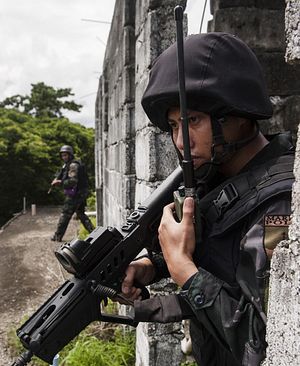The Association of Southeast Asian Nations (ASEAN) commemorated its golden foundation anniversary yesterday with the theme of “Partnering for Change, Engaging the World.” The ASEAN foreign ministers and 17 other dialogue partners converged in Manila to discuss top regional political concerns and international security threats in order to secure peace, stability, and economic developments for Southeast Asia’s more than half a billion diverse people.
While the regional bloc was expected to discuss pressing issues ranging from denuclearization of the Korean Peninsula to the conclusion of a Framework on a Code of Conduct in the South China Sea, the more than three-month old siege of Marawi in the southern Philippines makes a tangible case that violent extremism and regional terrorism remain real and threatening issues. With the convergence of top global policymakers and decision-makers in Manila as the region tries to combat terrorism, will ASEAN unite to cooperate against the threat of homegrown terrorists?
The heterogeneous region has a very strategic position, particularly given the importance of sea routes traversing the Straits of Malacca and the South China Sea. The number of coastal countries makes maintaining security a shared duty and responsibility among neighboring countries. Similarly, the spacious land boundaries between insular and peninsular Southeast Asia make it vulnerable to regional terrorism. Easy access to porous borders makes it easier for terrorists to launder their identities while also serving as operational space to plan, train for, and execute their attacks.
Southeast Asia has been the home of indigenous Islamic militant groups for decades. Today, the mix of socioeconomic marginalization, political corruption, loosening political controls, and ignorance toward the insurgence of militant groups has created a time bomb for the region. Despite large intelligence and internal security apparatuses in the region, there does not seem to be much comprehension about the differing capabilities of the ten nation-states in the region and the lack of technical or analytical capabilities to address regional security issues.
The ASEAN Political-Security Community (APSC) concept, which was embedded in the Bali Concord II in October 2003, hoped to help member-states achieve a secure environment to enhance prospects for internal stability and economic progress. The APSC initiative aims to use ASEAN’s own mechanisms to resolve disputes among members and to pursue much closer cooperation on transnational security challenges, including terrorism.
While the ASEAN Way values non-interference as a vital principle, this unique emphasis could be considered as a boon or a bane in terms of addressing transnational crimes like terrorism. Terrorism remains a sensitive topic, since it hinges on sovereignty issues. Thus coordinated action has been difficult, despite alarming instances of terrorism affecting civilians across the region. Countries in Southeast Asia, particularly the Philippines, prohibit foreign forces from directly engaging in actual combat on their soil. This has become a handicap, and is why the terrorist conundrum has lasted so long in the southern Philippines, despite tactical and operational support from ASEAN neighbors and major powers to crush jihadi terrorists in Marawi,
Military cooperation at the ASEAN level remains limited due to the member-states’ sensitivities and national sovereignty concerns, such as different approaches to national defense and cooperation, as well as different levels of development, equipment, and operational procedures that reflect the region’s inherent complexities.
ASEAN and its instrumentalities have a vital role to play in the campaign against terrorism. Combating terrorism requires a thorough analysis and assessment from counterterrorism agencies, inter-agency coordination, intelligence sharing, improved institutions, and enhanced military capabilities. Any war on terrorism must be comprehensive in its approach; cooperation is especially important in combating Islamic State-inspired threats. The application of punitive and preventive law enforcement measures can be substantial but an examination of the root causes of Islamic extremism should not only be socioeconomic and political but also ideological. These causes can be neutralized using the same dosage of counterstrategies in the fields of politics, ideology, and education.
Although collaboration is vital between nation-states in the region, each country must also conduct a comprehensive study to formulate its own method and effective framework for combating the existence of militant groups as each state may face unique obstacles in facing terrorism. Active measures on counterterrorism should be continuously assessed for their success and failures as jihadi terrorists have become a collective common threat in the region. ASEAN must forward efforts together, realizing the conjoined threat of terrorism can only be eradicated through strong integrity. If these steps are ignored, then ASEAN can expect more chaos in the future.
Chester Cabalza, Ph.D., is an Associate Professor at the National Defense College of the Philippines and a Senior Lecturer at the University of the Philippines Diliman. The views of the author are his and do not represent his organizational affiliations.

































